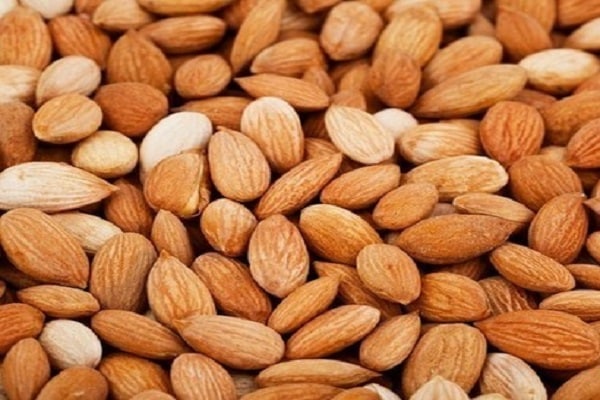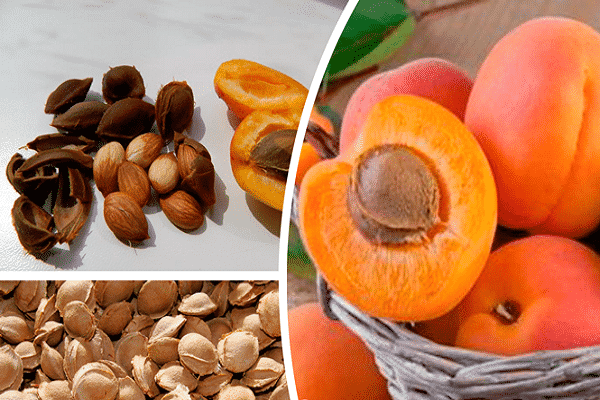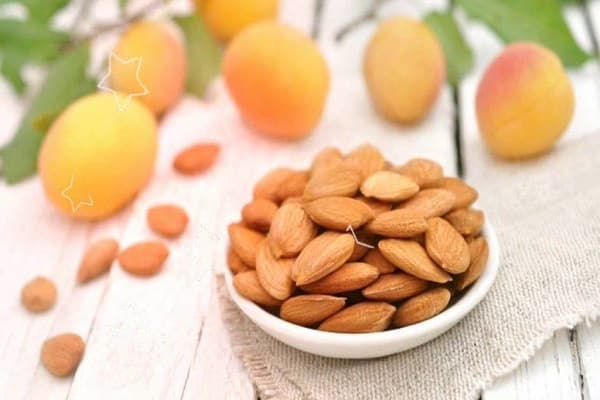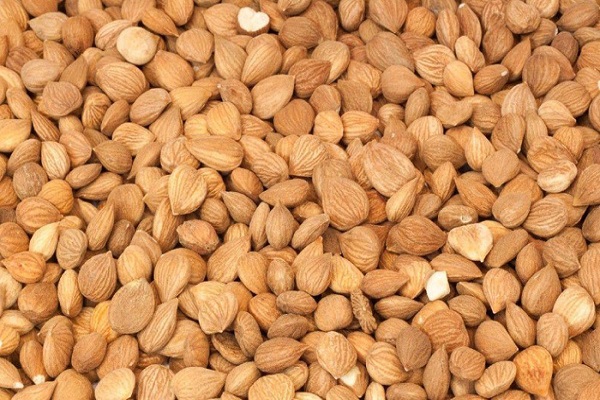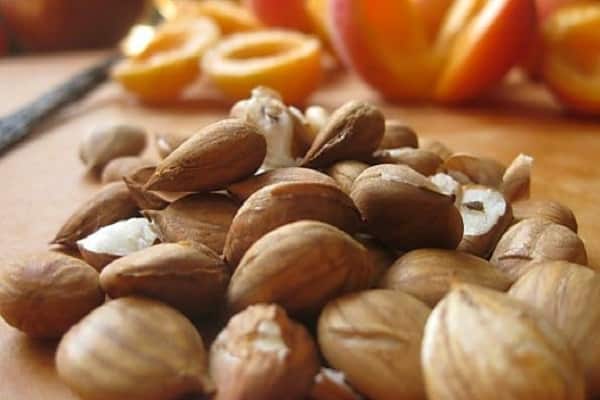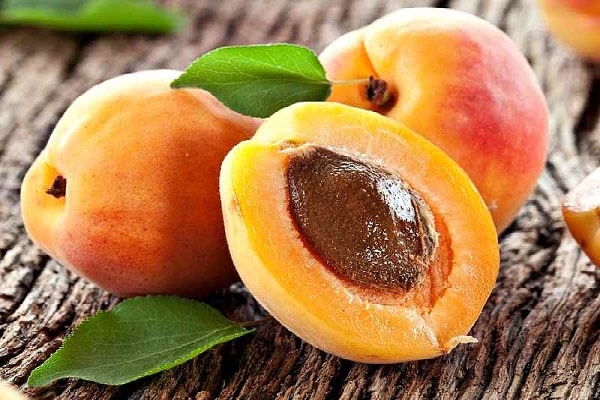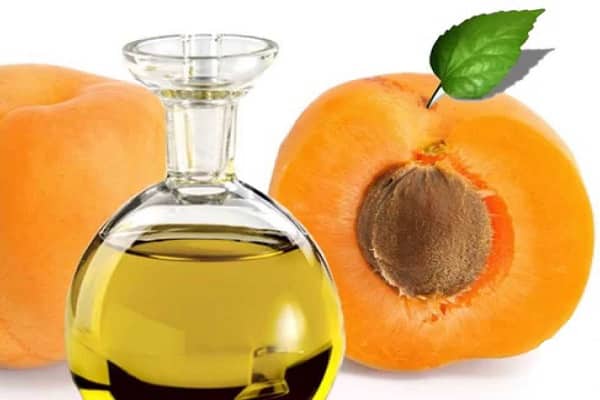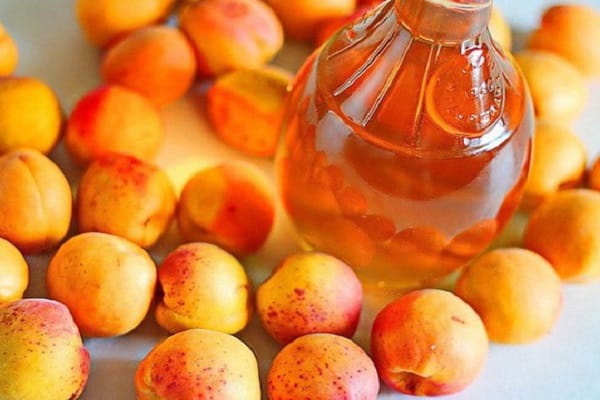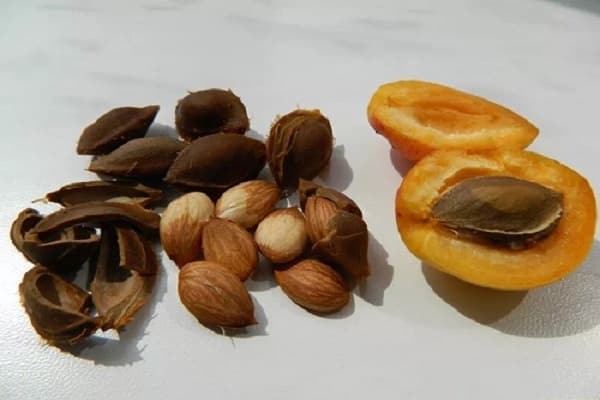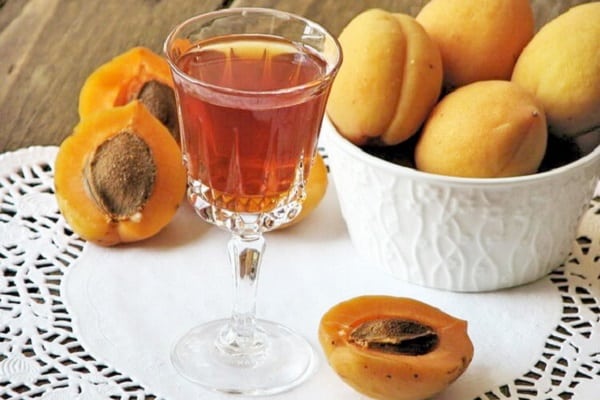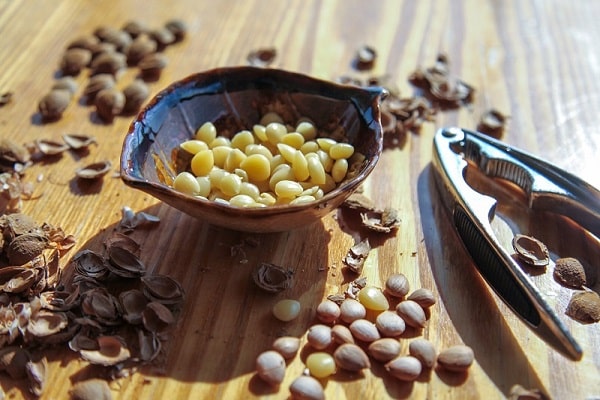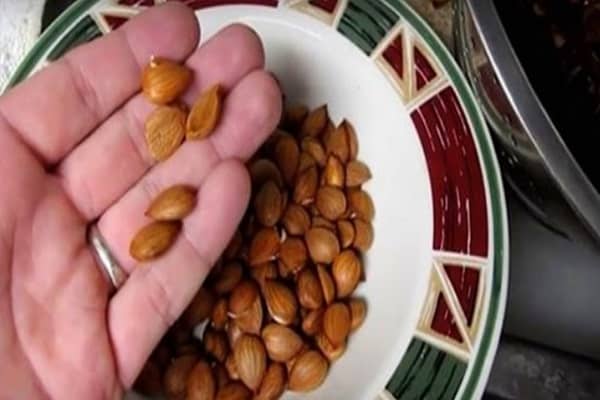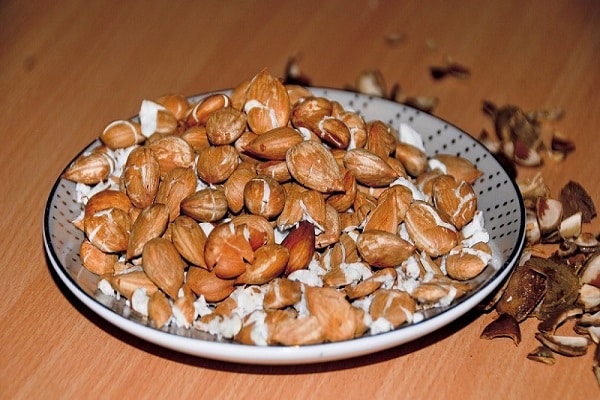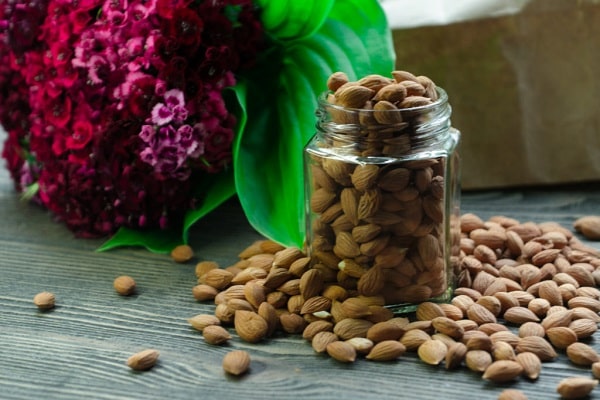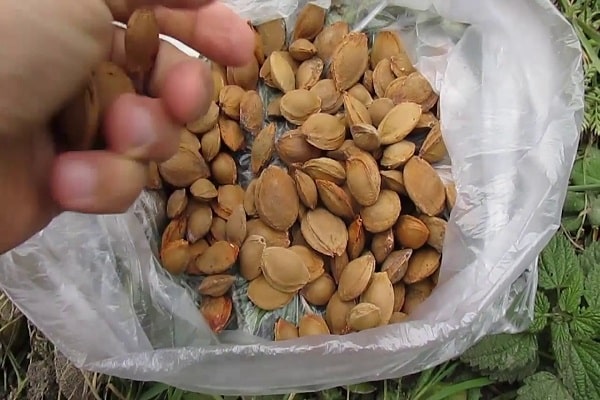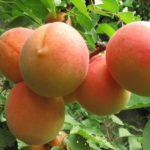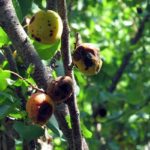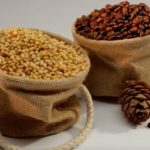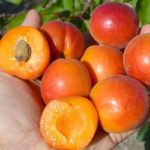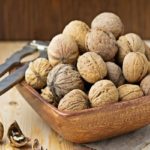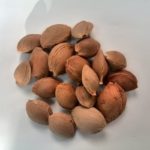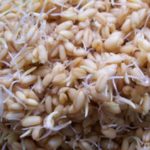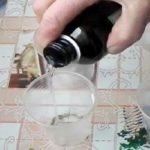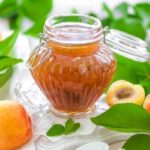Many people unknowingly throw away the pits of the fruit after eating apricots, depriving themselves of a valuable and healthy product. The unique properties of the grains were recognized in ancient times by Chinese healers, who widely used the fruit for medicinal and cosmetic purposes. To obtain the desired effect, it is important to know the benefits and harms of apricot kernels.
- Chemical composition of the seed
- The benefits and harms of seeds. Permissible norm per day
- For women
- For men
- For children
- For what diseases is it recommended to use?
- Infusions from grains for epilepsy
- Taking raw kernels for oncology
- Decoction for conjunctivitis
- Use for inflammatory lung diseases
- For joint pain
- For arrhythmia
- Against helminths
- Existing contraindications for oral administration
- The use of nuts in cosmetology and cooking
- How and how long are apricot seeds stored?
Chemical composition of the seed
The beneficial qualities of apricot kernels are due to the unique composition of the kernels. The calorie content of 100 g of product is 520 kcal. Nuts contain:
- several types of acids that are beneficial to the body and have a beneficial effect on the functioning of human internal organs;
- vitamins A, B, PP;
- a large amount of minerals;
- phospholipids;
- tocopherol
Amygdalin contained in the seeds belongs to the group of anticancer agents. Due to their large amount of antioxidants, nuts are often used in cosmetology and in anti-aging mask recipes. Eating grains can quickly restore the deficiency of potassium, magnesium, and phosphorus. Due to its high iron content, the product is able to normalize hemoglobin levels and have a positive effect on the circulatory system.
Apricot grains contain a high concentration of hydrocyanic acid, so they must be taken taking into account safety measures and not exceeding the permissible amount.
The benefits and harms of seeds. Permissible norm per day
Apricot kernels are used in various fields of medicine, cooking and cosmetology. Nuts are often used in alternative therapy recipes as a component for the preparation of healing remedies. The following properties are attributed to grains:
- anti-inflammatory;
- antiseptic;
- immunostimulating;
- anticancer;
- anthelmintic;
- regenerating.
The beneficial properties of the product can be negated if the permissible consumption of nuts per day is exceeded, as this can result in hydrocyanic acid poisoning. When determining the limit amount, the age and weight of the person are taken into account.The generally accepted rule for calculating the norm for an adult is to adhere to the ratio - 1 apricot kernel for every 5 kg of a person’s weight.
For women
For women, sufficient consumption of apricot kernels has a beneficial effect on health, since the nuts contain a large amount of fatty acids. They help slow down the aging process, help restore hormonal levels and normalize the body's protective properties.
Due to the high content of oils, vitamins and minerals, it has a positive effect on the entire body.
The norm for women is considered to be up to 10 seeds. The grains are not only taken internally. They are used to make masks for the face and body, and the oil restores the structure and shine of hair. Pregnant women and women during breastfeeding are not recommended to consume grains, since apricot is considered a strong allergen.
For men
For the male body, the benefits are associated with the high content of fat and protein in apricot nuts, so the product is often included in the diet of athletes and people who want to gain weight. It contains 29% oleic acid, which is considered a unique source of energy, and when consumed, there is better absorption of lipids.
The intake of grains is recommended for those whose work requires great physical effort. Adults can eat from 20 to 40 grains per day. With regular consumption, due to the content of linoleic acid in grains, cholesterol levels in the body are reduced, which helps to normalize the functioning of the heart muscle.
For children
Due to the high content of hydrocyanic acid in young children, it is not recommended to give a child more than 1 seed. It is believed that you can give as many grains as the baby is old.Heat treatment of the product allows the content of hazardous substances in nuts to be reduced.
For what diseases is it recommended to use?
The list of diseases for which grains are recommended to be eaten is quite wide. They are used raw and as an ingredient for the preparation of medicinal products. To obtain benefits for the body, you should not exceed the norm of nuts.
Infusions from grains for epilepsy
In the fight against epilepsy, apricot juice is used, which is consumed 0.5 liters per day. Nucleoli help increase the body's resistance to diseases of various kinds and increase the performance of all internal organs. The course of treatment should be 30 days, after which a break is taken.
If there is a threat of convulsive conditions, prepare a decoction for oral administration. To do this, take 8 tsp. apricot grains, pour 200 ml of hot water over them for 4 hours. The drug is taken 3 times a day before meals, 65 ml.
Taking raw kernels for oncology
The medicinal properties of apricot kernels are often touted as an anti-cancer agent. At the same time, there is no official confirmation or scientific research regarding the effectiveness of the fight against low-grade tumors.
However, such a component today can be found in many dietary supplements and supplements used for food for cancer. Alternative medicine advises eating 40 g of apricot kernels, dividing the specified amount into 3 doses. The course of treatment is 1.5 weeks, after which a break is taken.
Decoction for conjunctivitis
For conjunctivitis, use a decoction based on apricot kernels, which is applied to the eye area in the form of a lotion for 15 minutes. To prepare it, take 3 tsp. apricot kernels and pour 100 ml of boiling water for 4 hours.
Use for inflammatory lung diseases
Apricot kernels are considered a unique remedy for treating respiratory diseases. The use of such a product promotes the removal of sputum, so nuts are often used for bronchitis and whooping cough. To get rid of cough, include 1 tbsp in your diet daily. l. chopped nuts.
During periods of weakening of the body, nuts are used as a strong immunostimulant, and due to their high content of vitamins and minerals, they are often included in the diet of patients. To combat vitamin deficiency, 20 g of grains are mixed with 4 tbsp. l. honey and chopped zest, this mixture is consumed on an empty stomach daily, 1 tsp.
Apricot kernels for respiratory diseases can be eaten fresh or prepared as decoctions with medicinal herbs. To prepare them, it is most effective to use thyme, chamomile and coltsfoot flowers. Gargling with such infusions solves the problem of sore throat, which often accompanies colds.
For joint pain
To prepare rubs for legs and joints, prepare a product from 500 ml of vodka and 1 cup of crushed grains. The tincture is removed for 3 weeks, after which it is used for its intended purpose.
For arrhythmia
If your heart rate is unstable, it is recommended to take apricot-based teas. In order to cleanse and normalize the composition of the blood, it is recommended to take 1 tsp orally on an empty stomach. nuts burned to ash. To make a medicinal product you need:
- grate 0.5 kg of lemon;
- add 20 apricot grains;
- pour 0.5 liters of liquid honey;
- mix and keep for 3 days in a cool place.
This remedy is taken in the morning and evening, 1 tbsp. l.
Against helminths
Apricot grains are considered an excellent remedy for worms. For these purposes, they are consumed fresh on an empty stomach. The components of nuts have a depressing effect on pathogenic microorganisms, therefore they contribute to the normalization of microflora during dysbacteriosis.
Existing contraindications for oral administration
Only high-quality apricot seeds are suitable for food. Grains that have expired or have a rancid taste should not be consumed.. When deciding whether nuts can be consumed or eaten, certain health conditions must be taken into account. Should not be included in the diet for the following pathologies:
- diabetes;
- acute phase of liver disease;
- disturbances in the functioning of the endocrine system;
- problems with the functioning of the digestive system;
- apricot nut intolerance;
- state of pregnancy.
Excessive consumption of apricot grains is fraught with hydrocyanic acid poisoning. The maximum concentration of the substance is observed after 5 hours from the moment of administration. The person experiences a severe headache, nausea, and cramps, and may experience pain in the abdominal area. With severe poisoning, convulsions begin and heart failure can be triggered.
The use of nuts in cosmetology and cooking
Apricot nuts found their use in the field of cosmetology already in the 15th century, when the cost of such a product was comparable to the price of gold. Today, the oil can often be seen in shampoos, creams, masks and other cosmetics.It is used as a component that perfectly nourishes the skin, gives it elasticity, promotes faster healing of wounds and prevents aging.
The ability of the oil to lay down in a thin layer ensures that air access to the cells is not blocked. For hair, such a component becomes “life-giving”, as it acquires shine, silkiness and volume.
If you want to use the power of apricot kernels, you can use the following recipes:
- cleansing mask - oatmeal and milk are mixed in a 1:1 ratio, after 5 minutes add 1 tsp. butter and honey;
- moisturizer - 1 yolk mixed with 1 tsp. oils, applying to the face or body for 30 minutes;
- for hair - 1 tbsp. l. Apricot oil and 2 drops of lavender are applied to the hair for 30 minutes, then washed.
Today it is customary to add grains to confectionery and flour products. Bitter nuts are often used ground, which creates a unique nutty flavor. The seeds are used to make ice cream, desserts, and fermented milk products. Jam with apricot kernels is considered one of the best delicacies. Oil is practically not used in cooking.
How and how long are apricot seeds stored?
Apricot kernels can be stored whole or peeled. The first option allows you to extend the shelf life of nuts and helps to better preserve their beneficial properties. The recommended duration is 1 year.
Over time, the level of hydrocyanic acid in the product increases and it becomes unfit for consumption. It is quite easy to recognize spoiled seeds, as they acquire a bitter taste. It is correct to keep the grains in an airtight container, avoiding exposure to sunlight.

